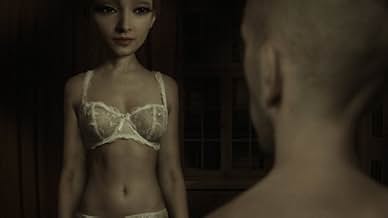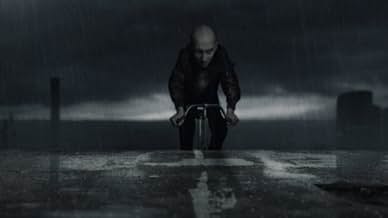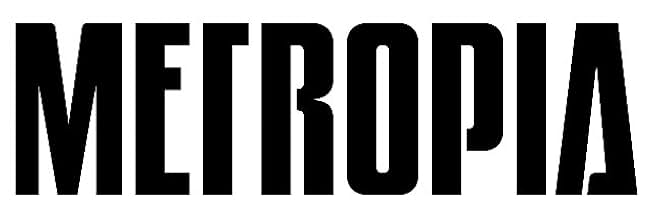CALIFICACIÓN DE IMDb
6.2/10
8.3 k
TU CALIFICACIÓN
Agrega una trama en tu idiomaA complex story of a misaligned man, though good intent, creating a nightmarish Dystopian existence.A complex story of a misaligned man, though good intent, creating a nightmarish Dystopian existence.A complex story of a misaligned man, though good intent, creating a nightmarish Dystopian existence.
- Dirección
- Guionistas
- Elenco
- Premios
- 3 premios ganados y 6 nominaciones en total
Juliette Lewis
- Nina
- (voz)
Shanti Roney
- Karl
- (voz)
Fares Fares
- Firaz
- (voz)
Fredrik Eddari
- Mehmet
- (voz)
Joanna Mikolajczyk Winterø
- The Metro
- (voz)
- (as Joanna Zofia Bard Mikolajczyk)
Magnus Skogsberg
- Roger's Boss
- (voz)
- (as Magnus Skogsberg Tear)
Opiniones destacadas
It's a story somewhere in the lines of 1984. Dystopian is a genre in itself and it's part of the New World Order conspiracy which has been the theme of many cinema and literature since the 50ies. So yes the core of the story is an old one and all has to come from the graphics, characters and small storyline differences.
In that aspect it's not a masterpiece but it is surely nothing to sneeze at. The animation is very okay. The characters are very average human beings which makes them easy to relate to and likable. The fact that the story is not completely new is not disturbing. Very much worth watching.
In that aspect it's not a masterpiece but it is surely nothing to sneeze at. The animation is very okay. The characters are very average human beings which makes them easy to relate to and likable. The fact that the story is not completely new is not disturbing. Very much worth watching.
Take a trip to Europe in the year 2024. This is a dark age, where the automobile is no longer in use, replaced by a cross country subway system. The most popular product on the market (in fact pretty much the only item) is a shampoo manufactured with a secret mind controlling chemical, which the major corporations use to monitor the public in George Orwell fashion.
In an age where animation can do anything, the decision to do almost nothing certainly stands out in film. Metropia is without doubt the bleakest animated feature I know; a murky institutional world, without a drop of color or sunshine, and everywhere we go is under lit. This makes enough sense when taking into account that this is a future where society is low on energy.
Not everything however feels credible. The absence of people in great numbers is unusual. The few people who do wander in and out of frame are almost hollow shells. They have no soul, but more importantly they have no movement. Metropia uses the least amount of energy possible to give life to illustrations. To attempt to describe it is not impossible, but it's something that is better off seen for ones self. Metropia is a haunting experience. It's almost a ghost world, not just from the absence of sight, but from the absence of sound. Metropia makes effective use of silence in all the right places, accompanied by an effective, very new age score.
As for the storyline, it is familiar, but not painfully so. It's similar to Brazil, which itself is the product of George Orwell's influence. The climax here feels a bit rushed, and easy, leaving Metropia a bit shorter than I think it should've been, but it remains an entertaining experiment.
In an age where animation can do anything, the decision to do almost nothing certainly stands out in film. Metropia is without doubt the bleakest animated feature I know; a murky institutional world, without a drop of color or sunshine, and everywhere we go is under lit. This makes enough sense when taking into account that this is a future where society is low on energy.
Not everything however feels credible. The absence of people in great numbers is unusual. The few people who do wander in and out of frame are almost hollow shells. They have no soul, but more importantly they have no movement. Metropia uses the least amount of energy possible to give life to illustrations. To attempt to describe it is not impossible, but it's something that is better off seen for ones self. Metropia is a haunting experience. It's almost a ghost world, not just from the absence of sight, but from the absence of sound. Metropia makes effective use of silence in all the right places, accompanied by an effective, very new age score.
As for the storyline, it is familiar, but not painfully so. It's similar to Brazil, which itself is the product of George Orwell's influence. The climax here feels a bit rushed, and easy, leaving Metropia a bit shorter than I think it should've been, but it remains an entertaining experiment.
One gets accustomed to certain styles of animation, not to mention certain themes. It's either for kids or adults, and it's either 2D or 3D. Of course there are exceptions but for the sake of simplicity, this Manichean duality dominates the market. It's rare that a film emerges that challenges these notions but Tarik Saleh's Metropia does that in fairly interesting ways. The style is an bit of a mash-up between 2 and 3 D - the frames are digitally composited from head shots that have been stretched and squashed then placed on smallish bodies creating creepy caricatures of the actors being photographed. The effect, visually, is of the puppetry in a Thunderbirds (or Supercar) episode as designed by Drew Friedman, with a heavy dose of dark Gilliam"esquire." despair. The animation is stiff, stylized and intentionally rough and jerky. Metropia is not super deep at it core, but it reminds me of the Heavy Metal comics I used to devour when I was a teenager, and that's not at all bad.
It's 2024, the world is running out of oil, and Europe has been connected via a huge subway system. The skies are always gray and it rains all the time. Roger, our protagonist, a bald, hydrocephalic, stoop-shouldered everyman, is afraid to take the metro because he has been hearing voices. He lives with his girlfriend who seems to always be on another planet. One morning, Roger is forced to take the metro because his bike (which he was using illegally anyway) has been destroyed. Sure enough, he begins to hear voices, a voice that has been seeping into his life away from the Metro, on top of everything. On that fateful subway ride, he sees Nina, the spitting image of the girl on his shampoo bottle - a shampoo called Dangst, if that gives any clue as to the relative depth of the film in question. On impulse - despite the urging of the voice in his head - Roger follows Nina, and discovers the world, not far beneath the surface, is not quite what it seems.
As I mentioned, the concepts are pretty thin. The requisite global corporate conspiracy, the rampant consumerism in a dysfunctional dystopia, and the soul-dead protagonist in a souls dead world, are requisite tropes for a film like this. Of course, They have been executed more competently, and in more depth, elsewhere, but the strength of Metropia is its visuals. It is animated for a reason. To that end, the spare, creepy animation style suits the film perfectly. By now, whiz-bang 3D animations are the norm, the rule, so it's at first disconcerting to see animation used so sparingly, minimally and strangely. But this is the point. The world has had all the life and energy sucked out of it, it's no wonder there's not much energy left for the inhabitants of said world. The familiar grey palette allows for even the most subdued tan coat and blonde hair of Nina's to stand out. This lack of movement is also a symbol of conformity. Literally, don't stand out.
Despite its familiar themes, Metropia is worth screening for the simple marriage of form and function it represents. It's a brave filmmaker, who, in this age of Avatar, chooses to make a quiet, simple, creepy film. Saleh, gives us a film, not breathtaking in it's scope, or necessarily ground breaking (except for what it doesn't strive to achieve: mindless spectacle) but calm, understated and worthy, for serious fans of animation, and the brand of sci if familiar to fans of Heavy Metal (the magazine, not the movie).
It's 2024, the world is running out of oil, and Europe has been connected via a huge subway system. The skies are always gray and it rains all the time. Roger, our protagonist, a bald, hydrocephalic, stoop-shouldered everyman, is afraid to take the metro because he has been hearing voices. He lives with his girlfriend who seems to always be on another planet. One morning, Roger is forced to take the metro because his bike (which he was using illegally anyway) has been destroyed. Sure enough, he begins to hear voices, a voice that has been seeping into his life away from the Metro, on top of everything. On that fateful subway ride, he sees Nina, the spitting image of the girl on his shampoo bottle - a shampoo called Dangst, if that gives any clue as to the relative depth of the film in question. On impulse - despite the urging of the voice in his head - Roger follows Nina, and discovers the world, not far beneath the surface, is not quite what it seems.
As I mentioned, the concepts are pretty thin. The requisite global corporate conspiracy, the rampant consumerism in a dysfunctional dystopia, and the soul-dead protagonist in a souls dead world, are requisite tropes for a film like this. Of course, They have been executed more competently, and in more depth, elsewhere, but the strength of Metropia is its visuals. It is animated for a reason. To that end, the spare, creepy animation style suits the film perfectly. By now, whiz-bang 3D animations are the norm, the rule, so it's at first disconcerting to see animation used so sparingly, minimally and strangely. But this is the point. The world has had all the life and energy sucked out of it, it's no wonder there's not much energy left for the inhabitants of said world. The familiar grey palette allows for even the most subdued tan coat and blonde hair of Nina's to stand out. This lack of movement is also a symbol of conformity. Literally, don't stand out.
Despite its familiar themes, Metropia is worth screening for the simple marriage of form and function it represents. It's a brave filmmaker, who, in this age of Avatar, chooses to make a quiet, simple, creepy film. Saleh, gives us a film, not breathtaking in it's scope, or necessarily ground breaking (except for what it doesn't strive to achieve: mindless spectacle) but calm, understated and worthy, for serious fans of animation, and the brand of sci if familiar to fans of Heavy Metal (the magazine, not the movie).
A very unique Scandinavian-English language film from the technical aspect. The only one kind in the whole world which is actually an experimental product from the new productions. It was made primarily using photoshop, and then adobe after effects for animation. If you're wondering what kind it is, actually a 2.5D animation, that means it is neither 2D or 3D, but between those two. Like tricking the 2D object as the 3D material.
Well they have succeeded to bring a visually impressive animation that mainly focused on the film character faces. The story was decent which is another dystopian concept where metro trains are the main content, hence it is called 'Metropia'. But the title also means 'visual refraction', that's what the story is slightly related too.
Anyway, it was very suspenseful till the final and mostly talking drama than physical action sequences. At some point I felt it was like the recent stop-motion animation 'Anomalisa', but realised that I predicted wrong and the story travelled in a different path to end decently. Though the overall film was very impressive from both technical and narrative wise. One must not miss it, just for a its rare kind, especially you like animations, but best suitable for adults.
7/10
Well they have succeeded to bring a visually impressive animation that mainly focused on the film character faces. The story was decent which is another dystopian concept where metro trains are the main content, hence it is called 'Metropia'. But the title also means 'visual refraction', that's what the story is slightly related too.
Anyway, it was very suspenseful till the final and mostly talking drama than physical action sequences. At some point I felt it was like the recent stop-motion animation 'Anomalisa', but realised that I predicted wrong and the story travelled in a different path to end decently. Though the overall film was very impressive from both technical and narrative wise. One must not miss it, just for a its rare kind, especially you like animations, but best suitable for adults.
7/10
it could be a dark utopia. or only reflection of present. in fact, it is a portrait. for fears, searches, self definitions, paranoia, secrets, conspiracies and perception of life as a long and gray chain of day by day. in same measure, it is a kind of explanation. for hidden realities, for dreams and expectations, for the status of people as tools, for the reasons escaping to the predictability, so, a reflection support. one far to be bad because animation is always inspired form for remind basic truths.
¿Sabías que…?
- TriviaAnna wears a T-shirt that says "Maybe he hasn't called because he's washing his hair".
- ErroresWhen Anna is doodling on the mail, it is clearly seen that the debt collection agency has spelled its business as "dept collection".
- ConexionesReferenced in Stockholms 20th International Film Festival (2009)
Selecciones populares
Inicia sesión para calificar y agrega a la lista de videos para obtener recomendaciones personalizadas
- How long is Metropia?Con tecnología de Alexa
Detalles
Taquilla
- Presupuesto
- SEK 32,000,000 (estimado)
- Total a nivel mundial
- USD 81,305
- Tiempo de ejecución1 hora 26 minutos
- Color
- Mezcla de sonido
- Relación de aspecto
- 1.85 : 1
Contribuir a esta página
Sugiere una edición o agrega el contenido que falta

Principales brechas de datos
By what name was Metropia (2009) officially released in India in English?
Responda





























